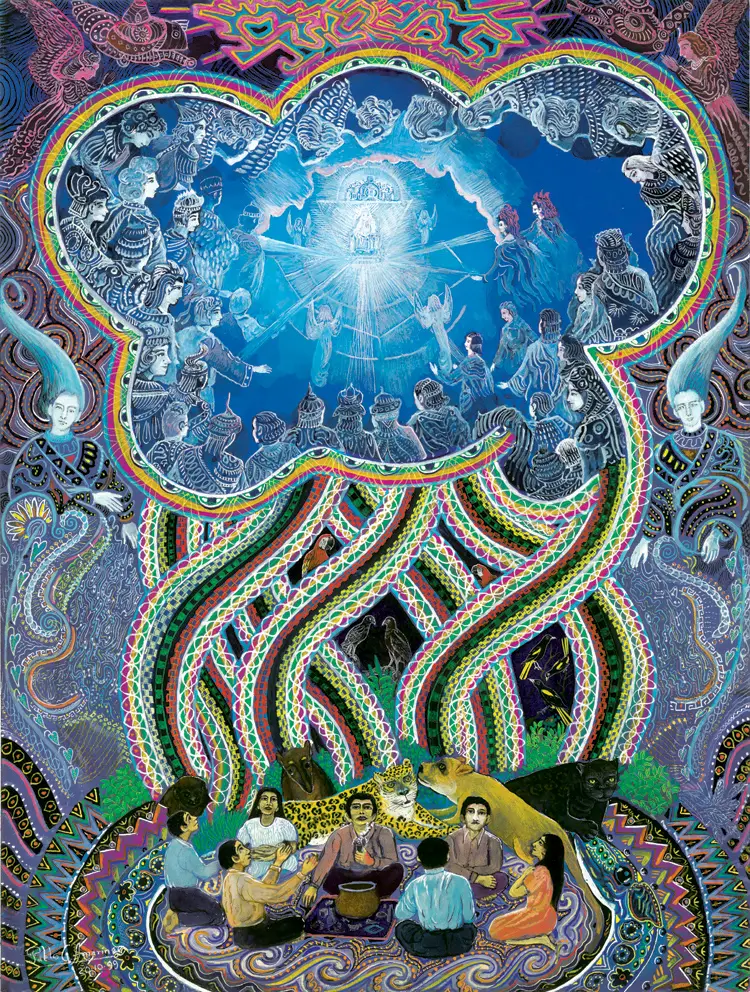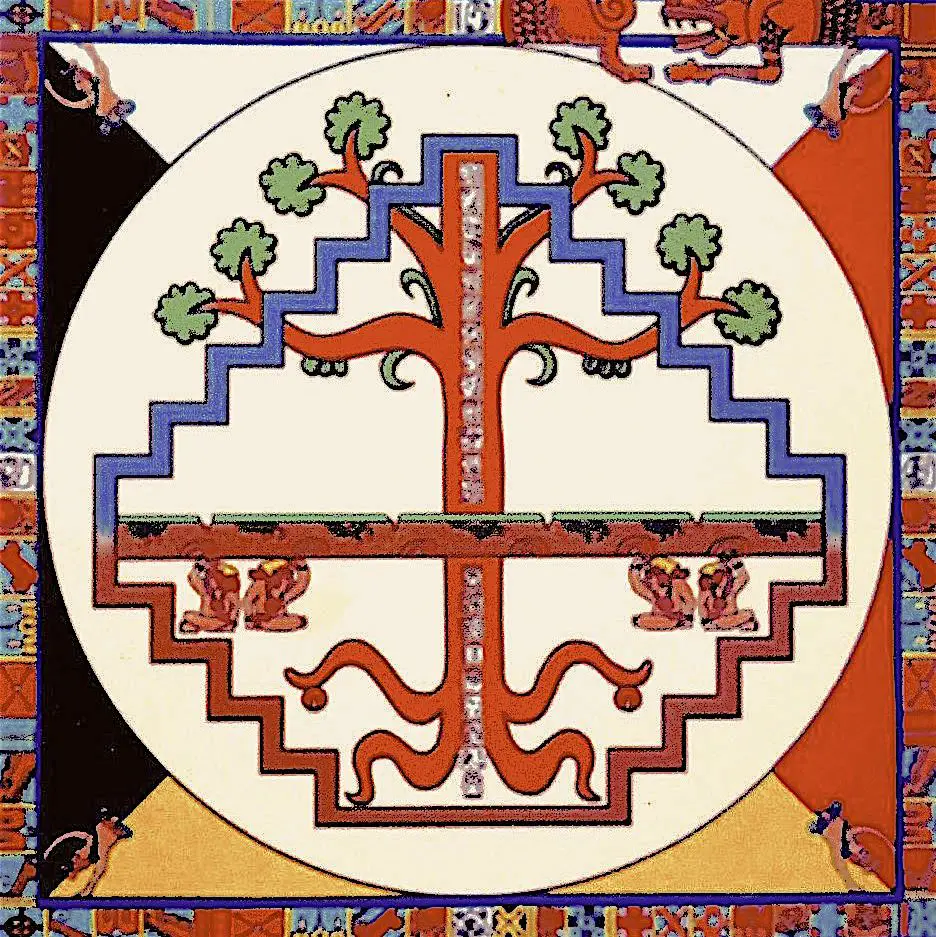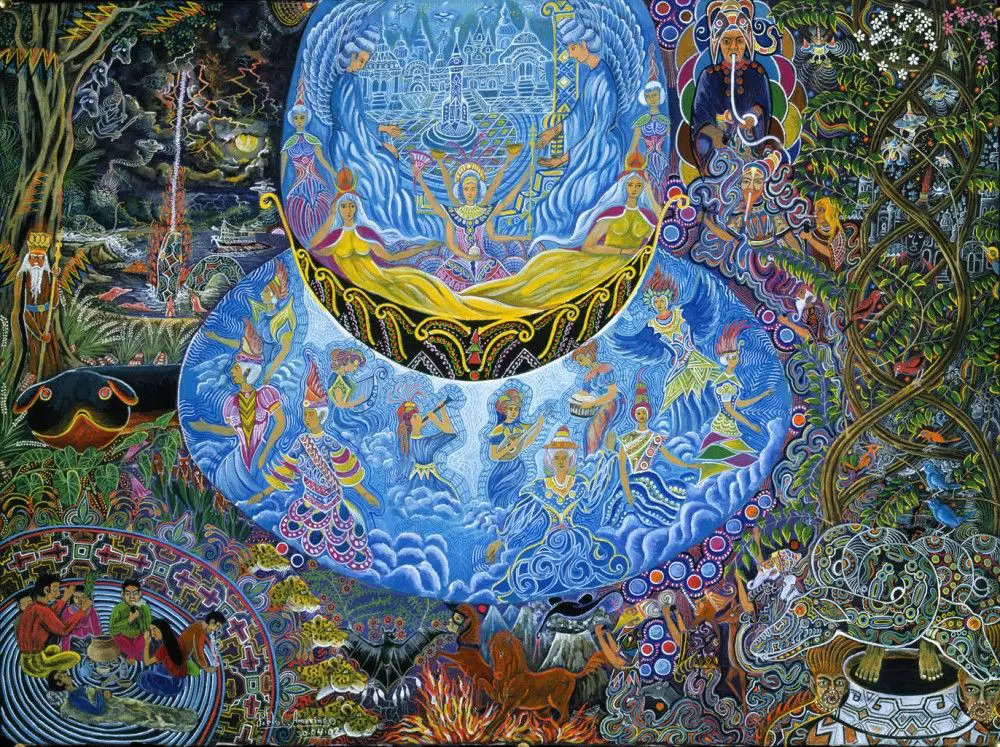Our video intervention at the SGPI20, last December, gave us the opportunity to briefly present the anthropological and sacred perspective with which the "AXIS mundi" project was originally conceived and then carried out in recent years, as well as (given the right opportunity) to identify the sacral elements discernible in the psychedelic experience. Here you can exclusively read the full text that will be published in the Conference Proceedings.
di Marco Maculotti
Presentation of "AXIS mundi" on the occasion of the General States of Psychedelia in Italy 2020 (SGPI20)
Compose "AXIS mundi" in a well-defined category it is not easy. Although focused on apparently very academic topics such as the history of religions, the anthropology of the sacred, ethnography and folklore, in reality the publications often also cover topics that are more difficult to classify in an academic perspective, like all those doctrines that usually come defined as "esoteric", ritual and "magical" practices, and last but not least the literature of the fantastic.
The "red thread" that unifies all these heterogeneous issues dealt with on the pages of "AXIS mundi" in reality, definitions and labels aside, is very clear, and can be traced back to the belief in the existence of a further world behind the one we do everyday experience with the ordinary senses: an occult and normally invisible world, which can be deciphered like a secret code, which the individual can exceptionally access during ecstatic and mystical experiences and of which the history of religions and ethnographic doctrines have given us innumerable testimonies through the millennia of human history.
Academically anthropology unfortunately she never concentrated on this interpretative perspective of the cultic and religious experience. When anthropology was born in the XNUMXth century, it was regarded in universities as a discipline almost entirely centered on the racial profile. In the second half of the twentieth century there was then a move to a nominally "cultural" perspective, but in reality more focused on sociological issues, and not on sacred traditions stricto sensu. I, on the other hand, believe that, if we really want to study the history ofhomo religiosus through the millennia, we must put it at the center of our own analysis the sacred experience itself, and all the world view that in traditional societies stood behind and made possible, collectively and individually, this experience.
Here it is essential to underline how the connection between the history of religions and psychedelia - or rather between the former and the so-called "Non-ordinary states of consciousness" - is obvious. The sacred experience in itself, collective as individual, is above all a literally "psychedelic" experience (revealing the psyche), something that has to do with overcoming the ordinary limits of the human being and at the same time with a higher realization of the individual element, what the ancient Greeks called daimon. All ceremonies in traditional societies aimed precisely at these objectives, as well as at others of a communal nature. Without obviously forgetting the very wide ritual use of psychotropic herbs or decoctions, in the shamanic practices of the hunter-gatherer peoples as well as in the mystery rites of the more stratified urban societies (cf. Sum of the Vedas and the Kykeon of Eleusis).
The same ritualistic system founded on the "Circle of the year", in which the ceremonies take place not only in a sacred space but also in a sacred time, determined by the solstices and equinoxes, by the revolutions of the sun, moon and other celestial bodies, is very important, because it makes us understand the fact that a true sacred experience becomes possible only by acting within well-defined space-time boundaries, which do not concern only the individual or the human community, but nature and the whole cosmos, the seasons, the stars.
Only by aligning himself with the rhythms of the cosmos was traditional man able to access what Mircea Eliade defined "Sacred time", the time of the rite in which the myth is reactivated and the human being can escape from the limits that normally force him into the ordinary state of consciousness, and thus find his Center. In this the points of contact with the psychedelic experience are very clear: even the time of the latter is in its own way "sacred" and "mythical", since it is clearly distinguished from the purely linear time in which the life of all days, individual as community, and it reveals itself as an epiphanic moment for the divine and archetypal powers. The time of the psychedelic experience, in this sense, is similar to the Dreamtime, the "Dream Time" of the Australian aborigines, a preter-temporal dimension in which the gods lived in close contact with men, animals and all that exists, without there still being a separation or differentiation between the parts.
It is no coincidence then if many topos which traditionally have to do with religious and ritual experience are slavishly found in thepsychedelic experience: think of the journey into the "underworld", the encounter with disembodied intelligences, the intuition of the existence of a "world behind the world" that we normally experience with the five ordinary senses, "mystical" states of consciousness, all intuition of divine or at least supernatural "signs", and so on.
In fact, one could almost say that in the post-modern West, where among other things the Christian religion itself has become more and more secularized and “profanized”, the psychedelic experience has taken the place left empty by the traditional sacred experience. The difference that immediately catches the eye, however, is the absence of a background mythical and traditional on which to base this experience, as well as the purely individual, and not community, connotation of the psychedelic experience compared to the traditional ritual one. Among the main objectives of «AXIS mundi» there is also that of making up for this lack, providing the reader tools and perspectives on which to base not only the psychedelic experience stricto sensu, but the whole "world view" that allows us to interpret reality in a more complex way, holistic if you like, or "mythical" as James Hillmann would say.

To make this paradigm shift possible, I find the element of Wonder, which on the other hand is central to the psychedelic experience itself. The Wonderful is an essential container to live "sacredly" or "mythically" one's journey in this world, and unfortunately one cannot help but notice how Christianity (or Monotheisms in general) on the one hand, and the road domain of Scientism , of Rationalism, of Materialism and of Historicism on the other, have significantly distanced the human being from this sentiment. I think of the Wonderful as al Gorgeous of Burke, in which the sacred experience is both wonderful and terrifying, as well as in the conception of the Sacred as Totally Other e Mysterium tremendous by Rudolf Otto. This, it will be noted, is an element that is found very similar in the psychedelic experience: the encounter with the Other is at the same time the cause of Ecstasy and Terror.
And here we come to the literature of Fantastic: because I believe that in the last two centuries at least the sacred experience has found a substitute precisely in this literary vein, which in some way anticipated the Psychedelic Renaissance as well. Let's think only of ETA Hoffmann, who in the first twenty years of the 1800s created real literary masterpieces absolutely psychedelic, and more recently of authors such as William Butler Yeats, Arthur Machen, Gustav Meyrink and HP Lovecraft, true creators of universes, demiurges of their own mythopoiesis that go beyond mere fiction and literary creation, taking inspiration from and giving new life to the mundus imaginalis of folklore and myth, previously relegated by devotional religions, rationalism and materialism to mere fairy tales for children. With these authors, folklore and myth return to the foreground, and it is no coincidence that the experiences lived by the various protagonists of their works are in all comparable to real psychedelic experiences, in which those who have personally experienced such experiences will be able to easily mirrored.
The same Folklore, on the other hand, it is based on a very ancient concept of existence, so to speak "initiatory", and could be described as a sort of cultural container of the collective unconscious that over the centuries has gathered all that knowledge and experiences "other" than the dominant culture, Christian and rationalist, which had excluded them from common thinking: just think of all those "other" entities of which popular traditions abound, whose existence is to be framed in a sacred and holistic, animistic or even shamanic perspective of existence and reality. From the perspective of traditional religions, the cosmic organism is founded on several levels, some of which can be experienced by the human being only on certain ritual, ceremonial, sacral (or, as far as the post-modern West is concerned, "psychedelic") occasions.
It is no coincidence that folklore has survived in its most traditional form in those rural communities which, even at the beginning of the XNUMXth century, were strongly connected to the seasonal rituals of the circle of the year, to the knowledge of herbs, and so on. From this point of view, it can be said that the roots of Psychedelia should be sought in this ancient and traditional world, which for millennia considered reality from one complex, multi-dimensional, holistic, ritual and sacral perspective, in which the existential experience of the human being was inserted in a cosmic and absolutely not anthropocentric framework.

Individuals of the Western world literally have as the centuries go by delegated one's conscience, first as regards the religious experience to ministers of worship, which with the advent of Christianity become an obligatory passage for the individual to experience the sacred, and then, especially in recent centuries, to various categories of "specialists ”, Of science, of politics, even of the way of thinking. The vision of the world that each of us should develop independently is now delegated to the "intellectuals" of the television salons, to the exponents of political parties, to journalists, to all these categories of an influencer. Everything has become black or white, morally right or wrong, real because it is approved by the "information specialists" and science or fake. In this way, the complex, holistic and multidimensional vision that had characterized the history of traditional human cultures, not least Western ones, such as that of the ancient Greeks or more recently the hermetic Renaissance one, not surprisingly so rich in pagan mythological references.
In traditional cultures, what was considered right or wrong was rarely moral in a moral sense, but it was based solely on rhythms of the cosmos and of nature: the same psyche human moves according to the same rhythms. Even beliefs and habits that contemporary man, so secularized and now devoid of a sacred conscience in the sense that has been said, can rightly make you turn up your nose and even scream about "sexism" (I am thinking, for example, of prescriptions and taboos on female menstruation) found their raison d'etre and their ultimate meaning in a conception of the cosmos and the world centered on invisible powers who govern them, male and female, uranic and chthonic, diurnal and nocturnal, and so on; the human being had to adapt his individual and community actions to them, in a holistic, synergistic and non-anthropocentric perspective, which took into account the differences existing in nature but also their points of union, their possible coincidence oppositorum. There was no Manichaeism or strict dualism in this kind of worldview, on which the rite and the cult were founded.
Il rite, to be effective, it needs well-defined limits - spatial, temporal, etiological and ontological limits - which can hardly be considered from a moral perspective stricto sensu, as is instead typical of monotheisms but also of post-modern secularism of the Western world, and in any case May moralizing. Sacred experience, individual as well as community, becomes possible only if we adhere to these principles, these limits, these complex correspondences that exist between the human psyche and the natural and cosmic world. The psychedelic experience, from this point of view, does not stand out very much.
Think for example of matches among planets, metals, days of the week, plants, perfumes, etc., which have always characterized ritual and magical practices. In this "magical" perspective, which also emerges in the psychedelic experience, the real is multifaceted, complex, multidimensional, and not dichotomous. There is no absolute Good or Evil, a Right and a Wrong in the moral sense, but correspondences or differences between the individual parts of a Whole which, considered from a cosmic and supra-human perspective, is nevertheless thought of as One: like the Bread degli Orphics, that is the Universe seen as an organic whole, in spirit, soul and matter, heterogeneous components that act reciprocally at all levels. This is also a conception of the cosmos that is experienced in the psychedelic experience.

The publications in «AXIS mundi» take this into account complexity, for this reason over the years I have given voice to authors whose perspectives and visions of the world do not necessarily match my own. I am convinced that the healing of reality and our "broken" conscience you necessarily pass from this change of conceptual paradigm, from the dichotomy that haunts the world of Ideas as never before to a real complexity that recalls the interplay of the correspondences of the magical, shamanic and esoteric doctrines of the history of humanity and the pantheons of "pagan" religions, with their multitudes of gods and demons, fairies and spirits.
This worldview has been demonized in the last two millennia by monotheistic cults which, in the final analysis, have demonized the very complexity of man and the world, detaching the first from the second, placing it in a dichotomous (and tyrannical) position towards of nature and consequently burdening it with a series of guilt complexes and psychosomatic disorders strictly connected to the paradigm shift from the traditional to the "modern" world: the repressed gods, as Hillman teaches, do not die, but return as psychic pathologies.
One of the primary objectives to which the psychedelic experience calls us, as a substitute for the sacred and ritual one of traditional societies, of which we can reluctantly say "orphans", is therefore in my opinion this: to return to the "broken" consciousness of the human being its complexity, and with it the complexity of the cosmos in which he finds himself existing.

4 comments on “Presentation of «AXIS mundi» at the General States of Psychedelia in Italy 2020"